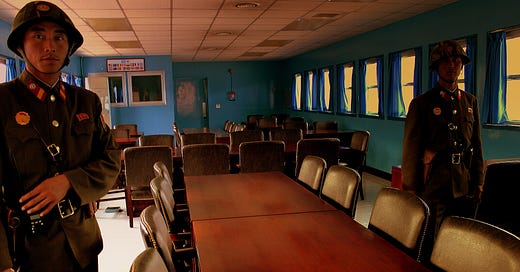Gaza Education, Ukraine’s Chechen Fighters, Deterrence in the Middle East, and More
This week at Inkstick.
Hello, everyone.
We’re already two weeks into 2024, and the world is still aflame with wars in the Gaza Strip and Ukraine.
In war-ravaged Gaza, the overwhelming majority of the local population has been displaced, with many seeking refuge in schools that now serve as shelters. Mohammed Ali, who reports under a pseudonym, looks at the way the war has taken a devastating toll on education for Palestinian students across the Strip.
Meanwhile, it is that very war that is spiking tensions across the Middle East, and Washington is finding itself increasingly at odds with Iranian-backed groups from Yemen to Iraq. If the US continues its path of deterrence, argues Alexander Langlois, it will continue to put its troops and civilians at greater risk across the region.
That’s not all we’ve got at Inkstick. And if you’re not already, please follow us on Twitter, LinkedIn, Threads, Facebook, Instagram, and YouTube.
Here’s what’s new at Inkstick Media this week:
“War’s Devastating Effect on Gaza’s Education” by Mohammed Ali (Jan. 8)
Throughout Israel’s war in the Gaza Strip, more than 85% of Palestinians residing in the territory have been displaced and tens of thousands of buildings have been destroyed. Schools are serving as shelters, and students are struggling to complete their education.
“In Eastern Ukraine, Chechen Battalion Warns Russian Victory Would Bring War to Europe” by Joseph Roche (Jan. 8)
Battle-hardened from the Chechen Wars, Sheikh Mansour Battalion fighters worry a lack of aid will make it impossible for Ukraine to recover territory from Russia. Yet, setbacks or not, Aslan insists that Ukraine will continue maintaining its position and inflicting heavy losses on the Russians.
“Deterrence is Not Working in the Middle East” by Alexander Langlois (Jan. 9)
The Israel-Gaza war has sent tensions soaring across the Middle East, notably between the United States and Iran. Washington should consider the relative lull in attacks on its forces during the previous truce and push for further cessation of hostilities — or risk putting US troops and civilians at greater risk across the region.
“Amid Gaza's Destruction, Palestinians in Exile Push to Preserve Cultural Heritage” by William Christou (Jan. 9)
In 2004, Dr. Mohammed Khatib began collecting artifacts and antiquities from Palestinian refugees in his neighborhood, from colleagues, and even asking friends to bring him handicrafts from Palestinian artists. The result is the Memories Museum, a cramped room in the heart of Shatila, a place whose walls are lined with mementos of Palestine. Amid the Gaza war, Khatib and other Palestinians in exile say preserving cultural heritage has become more important than ever.
“Nuclear Arms Buildup Isn't Just about War. It Also Harms People and Communities” by Laura Considine (Jan. 10)
A new buildup of nuclear weapons and talk of fighting nuclear war are dangerous. After all, we know there is no winner of a nuclear war, never mind two. But even if those weapons are never used, they have impacts on the places and peoples in which they are produced.
“Can the US and North Korea Chart a Path Toward Peaceful Coexistence?” by Frank Aum (Jan. 10)
The United States and North Korea coexist today in an antagonistic, high-risk stalemate. The Kim Jong Un government, feeling besieged by a “hostile” US policy and fearing the potential for regime change, has centered its national defense strategy on strengthening deterrence through nuclear weapons. But the US policy of pushing for denuclearization is outdated, and pursuing a path of peaceful coexistence should be prioritized.
“In a World Divided by Borders, Is There Anywhere Left to Run?” by Rebecca Gordon (Jan. 11)
Recounting her own family’s history of displacement and migration, Rebecca Gordon takes a hard look at the state of ever-sharpening borders across the world. With the number of displaced people around the world growing by the year, Gordon asks, where will they find refuge in 2024?
“Deep Dive: Czech the Turnout” by Emily Tamkin (Jan. 11)
Published in the December 2023 issue of Communist and Post-Communist Studies, a new study examines how COVID-19 impacted the Czech 2020 regional elections. Although infections were lower than elsewhere in the European Union, they surged after the vote to the highest cases per million of any country in the world.
“The War in Gaza is a Crisis of Borders” by Anna Lekas Miller (Jan. 12)
Unlike the Syrians who crossed the borders into Turkey and Lebanon to flee Bashar al-Assad’s civil war, or the Ukrainians who sought safety from Russia’s full-scale invasion in countries like Poland, Romania, and Belarus, very few Palestinians displaced by Israel’s assault on Gaza have been able to seek refuge by crossing international borders.
From the desk of Patrick Strickland, managing editor of Inkstick Media.





